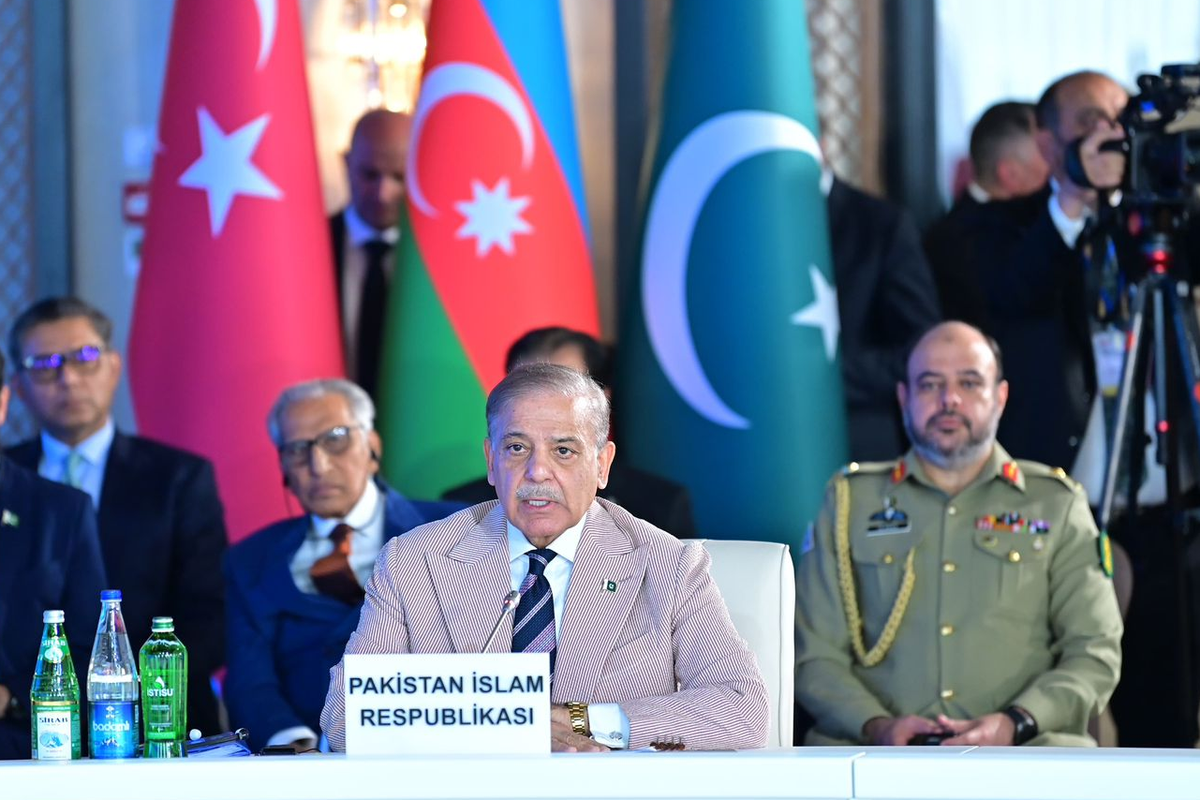Pakistan says peace with India hinges on ‘honest dialogue’ and resolution of Kashmir issue
Turkish, Azerbaijani presidents call for stronger regional cooperation and lasting peace at second Trilateral Summit in Lachin alongside Pakistan
News Desk
The News Desk provides timely and factual coverage of national and international events, with an emphasis on accuracy and clarity.

Prime Minister Shehbaz Sharif says that if India engages with honest intent, Pakistan is also open to exploring trade and economic cooperation.
@GovtofPakistan/X
Prime Minister Shehbaz Sharif reaffirmed on Wednesday Pakistan’s commitment to peace in the region and expressed the country’s willingness to resolve all bilateral issues with India through dialogue—provided New Delhi demonstrates sincerity and cooperation.
Speaking at the Second Trilateral Summit in Lachin, Azerbaijan, alongside the leaders of Turkey and Azerbaijan, the prime minister referenced recent tensions with India. According to the state-run Associated Press of Pakistan (APP), he said Pakistan—through the grace of Allah, the resilience of its people, and the support of friendly nations and its armed forces—had successfully confronted aggression.
“We have always sought peace in the region, and that peace can only be achieved through talks on all pressing issues — particularly Kashmir,” the prime minister stated in his nationally televised address. He emphasized that the Kashmir issue must be resolved in line with United Nations Security Council resolutions and the aspirations of the Kashmiri people.
PM Sharif strongly condemned India’s attempts to politicize the Indus Waters Treaty, which he described as the “lifeline” of 240 million Pakistanis.
“It is most unfortunate that India tried to threaten to stop the flow of water into Pakistan. This is not possible -- it has never been possible, and it will never be possible. We are taking all necessary measures to ensure India is never able to act on this threat,” he said.
On the issue of terrorism, the prime minister said that Pakistan remains open to discussions with India, provided the dialogue is rooted in sincerity.
“We are among the biggest victims of terrorism globally. We have lost 90,000 lives and suffered $150 billion in economic damages over the decades. No one can question our resolve to eliminate this menace once and for all,” he added.
He said that if India engages with honest intent, Pakistan is also open to exploring trade and economic cooperation.
The prime minister lauded Chief of Army Staff Field Marshal Syed Asim Munir for his leadership during the recent conflict, describing him as “God-fearing, fearless, and unwavering in the face of aggression.” He said the armed forces, under Munir’s command, responded with courage and professionalism, while the entire nation stood united behind them.
Shehbaz also criticized India for failing to provide credible evidence in the aftermath of the Pahalgam incident and for rejecting Pakistan’s offer of an independent international investigation.
Turkish, Azerbaijani presidents call for deeper regional ties and peace
According to state-run Radio Pakistan, Turkish President Recep Tayyip Erdogan commended Pakistan for its measured response during heightened tensions with India. He welcomed the ceasefire between the two countries and expressed hope that it would lead to lasting peace.
“Turkey stands ready to offer any support needed to achieve permanent peace,” Erdogan said.
He also voiced concern over what he called a global crisis of legitimacy in the international system, citing Israel’s relentless oppression and expansionist policies in Palestine. Erdogan urged the international community to intensify pressure on Israel to secure a permanent ceasefire in Gaza.
Highlighting the significance of the trilateral summit, the Turkish president proposed institutionalizing Pakistan-Turkey-Azerbaijan cooperation through regular summits and ministerial meetings. He also stressed strengthening defense collaboration and joint efforts in trade, investment, and digital transformation.
Azerbaijani President Ilham Aliyev outlined his country’s vision for expansive cooperation with Pakistan and Turkey. He announced Azerbaijan’s plan to invest $2 billion in Pakistan’s economy, noting potential in defense, energy, transport, agriculture, and information technology.
“We aim to strengthen cooperation in defense industries, joint military projects, and training exercises to ensure peace and stability across our shared geography,” Aliyev said.
He also highlighted the need for broader cultural and academic exchanges among the three nations to foster greater people-to-people connectivity.










Comments
See what people are discussing